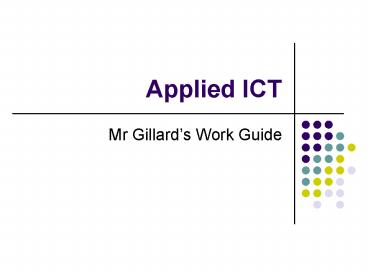Applied ICT - PowerPoint PPT Presentation
1 / 18
Title:
Applied ICT
Description:
Over the following weeks you will be making a presentation for your applied ... They can buy products on-line easily and have access to a ... Minidisk, MP3 ... – PowerPoint PPT presentation
Number of Views:88
Avg rating:3.0/5.0
Title: Applied ICT
1
Applied ICT
- Mr Gillards Work Guide
2
Information about Mr Gillards part of the course
- Over the following weeks you will be making a
presentation for your applied ICT portfolio - The following will be useful for you to know
- Assessment criteria
- Unit 3 Topics
- (press the button for information on what you
would like to know more about)
3
Applied ICT.
- Portfolio 2
- The Presentation Assessment criteria
4
Candidates must produce
- an on-screen presentation detailing the impact of
ICT developments in the areas specified, which
can be in the form of a slide show. - This should include
- a description of the groups or individuals
affected in each of the areas - a description of the needs met and benefits
available through the use of ICT in each area - a consideration of the consequences for
individuals or groups who have restricted or no
access to ICT in these areas
5
Assessment grid for marking work.
6
Applied ICT.
- Unit 3 ICT in society
- Information and help pages.
7
Select the Topic you want to know more about.
8
3.2 How ICT is used in business
- You will need to understand how ICT has affected
how all sectors of the economy do business and
how in turn this affects customers, including the
effect of the speed with which transactions can
be done. For example - Customers buying from home - online shopping and
banking, comparing products and services such as
travel, financial products, online auctions - Technical services - customised databases,
security - Call centres and customer enquiries
- Advertising and marketing.
9
3.3 How ICT has affected work styles
- You will need to investigate how ICT has changed
work styles. For example, you could investigate - the places in which people work where people
work, how business practice has changed - people's work patterns
- use of e-mail, mobile phones, laptops
- what ICT skills and training employees require
- specialist ICT packages, new technology
- the way people interact at work
- how does ICT affect communication between people,
eg using e-mails instead of talking directly to
each other - the types of jobs available
- e.g. ICT has automated many "traditional" jobs
from office work to manufacturing, but has
created other specialist jobs such as website
designers, software and hardware engineers
10
3.5 How ICT has affected personal communications
- You will need to investigate how ICT has affected
the way in which people go about their daily
lives, for example - The Internet
- Mobile Phones
- Entertainment and Leisure
- Education and lifelong learning
- (Select the sub-topic you want to know more about)
11
The Internet
- People have a wide range of products and services
to choose from - They have access to businesses all over the world
- They can buy products on-line easily and have
access to a range of "internet only special
offers
12
Mobile phones
- Contacting people 'on the move'
- Personal security, including alerting emergency
services - The cost and ease of keeping in touch with others
- The use of WAP technology to access the Internet
- Disadvantages of mobile phone use
- eg high tariffs, overuse, nuisance of using
phones in public
13
Entertainment and leisure
- The range of technologies available
- E.g. DVD, CD ROM, Minidisk, MP3
- How the development of ICT is affected by the
consumer's changing needs and tastes - E.g. more realistic computer games
14
Education and lifelong learning
- Access opportunities for people from varied
locations - The range of learning opportunities available
- Access to up to date and comprehensive research
materials.
15
3.6 How ICT is used in community activities
- You will need to investigate how ICT is used in
community activities, including - Cyber cafés and other public access points
- e.g. public libraries
- On-line discussion forums,
- e.g. interest and pressure groups, lobbying
- Information services,
- e.g. museums, libraries, finding a venue
- Public transport and travel information e.g.
arranging itineraries - Satellite positioning systems used in outdoor
pursuits - e.g. sailing.
16
3.7 ICT and people with special/particular needs
- There are large numbers of people who need to use
ICT adapted to their particular needs, in order
to have improved quality of life.
17
3.7 ICT and people with special/particular
needs (cont.)
- You will learn how ICT can offer improved access
to those with - sensory impairment
- physical disability
- limited mobility
- learning difficulties
- language difficulties
- multiple disabilities
- vibrate alert telephones and pagers
- video conferencing
- SMS
- online shopping
18
3.7 ICT and people with special/particular
needs (cont.)
- You will investigate what specially-adapted ICT
hardware and software is available, such as - incoming speech amplifiers and induction loops
- speech synthesisers and voice recognition systems
- environmental control systems
- The changes that ICT brings to this group in
society mirrors changes that the industry brings
to other user groups, such as schools and
colleges, rural groups, and official agencies.































